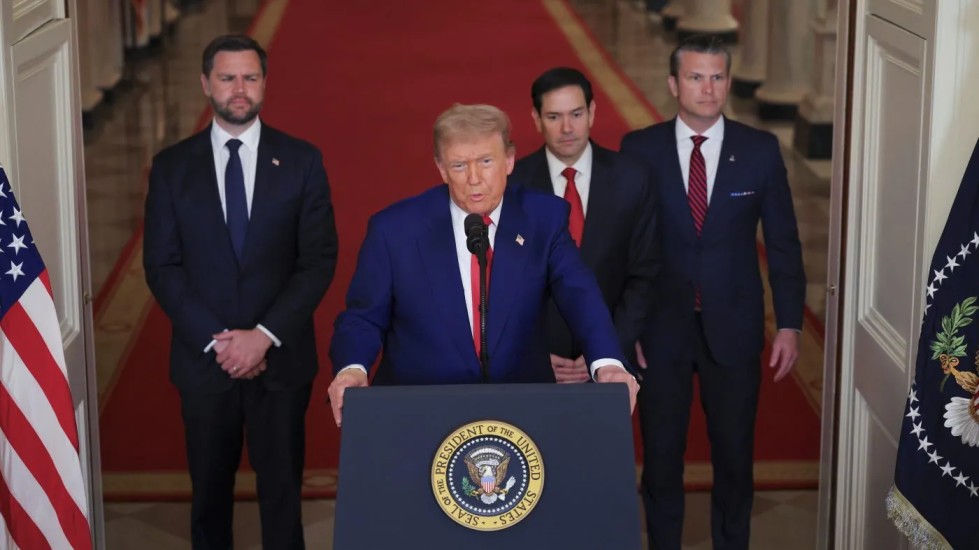U.S. strikes "crippling blow" to Iran's nuclear program- Trump

Speaking from the White House in a nationally televised address, Trump confirmed that the strikes had "completely obliterated" key Iranian nuclear facilities and warned Tehran against further escalation.
President Donald Trump has declared that U.S. airstrikes carried out on Sunday dealt a "devastating" blow to Iran's nuclear infrastructure, marking a turning point in the escalating conflict between Israel and Tehran.
Speaking from the White House in a nationally televised address, Trump confirmed that the strikes had "completely obliterated" key Iranian nuclear facilities and warned Tehran against further escalation.
The targeted assaults, coordinated with Israel, hit major sites including the Fordo underground enrichment plant and nuclear installations in Natanz and Isfahan.
“We have dismantled Iran’s core nuclear capabilities,” Trump stated, adding that the United States would strike again “with greater force” if Iran refused to pursue peace.
This move signals a sharp escalation from a U.S. president who has long touted his opposition to prolonged foreign wars.
Iran had earlier cautioned that any American involvement in the conflict would provoke a response, intensifying fears of a broader regional war.
Israeli Prime Minister Benjamin Netanyahu applauded Trump’s decision, calling the strike “a historic shift” backed by American military power.
Meanwhile, Iranian state outlets acknowledged that multiple nuclear facilities had been hit, though they claimed there were no radioactive leaks. Saudi regulators also reported no radiation detected in the Gulf following the attacks.
Trump’s address came just days after he hinted at a two-week window to decide on joining the Israel-Iran conflict. Instead, he acted within days, opting for swift military intervention.
Flanked by Vice President JD Vance, Defense Secretary Pete Hegseth, and Secretary of State Marco Rubio, Trump said the Pentagon had more targets lined up if Tehran failed to respond diplomatically. “We’re not done. Iran must choose peace,” he warned.
Despite his aggressive tone, Trump refrained from calling for regime change, a step he had alluded to in earlier remarks where he branded Iran’s Supreme Leader Ayatollah Ali Khamenei as vulnerable.
According to U.S. media, the assault involved B-2 stealth bombers equipped with bunker-busting munitions and submarine-launched Tomahawk missiles.
On his Truth Social account, Trump celebrated the operation, praising American forces and confirming all aircraft had returned safely.
Photos released by the White House showed Trump in a signature red MAGA hat consulting with national security advisers in the Situation Room shortly before the operation was announced.
In a post-strike message, Trump cautioned Iran against launching a counteroffensive, warning of severe consequences.
The conflict has already seen Iranian proxies, including Yemen’s Houthi rebels, threaten renewed attacks on U.S. interests in the Red Sea.
Tensions have soared since Israel’s initial strike on Iran on June 13. Both countries have since exchanged rounds of attacks, drawing in allies and destabilizing the region.
Following the U.S. strikes, Trump reportedly spoke with Netanyahu and had provided prior notification to Israeli officials, according to senior White House sources.
Iranian President Masoud Pezeshkian had earlier vowed a “stronger retaliation” if Israeli bombardments continued.
Though Iran insists its nuclear program is for peaceful purposes, Pezeshkian affirmed that no threats or military action would deter its sovereign right to civilian nuclear development.
Meanwhile, Iran’s Revolutionary Guard announced the launch of "suicide drones" aimed at sensitive locations within Israel early Sunday.
Back home, Trump’s move has triggered political friction. Some within his own MAGA base voiced concern that the strikes contradict his campaign promises to avoid overseas military entanglements.
Critics reminded Americans of Trump’s 2016 pledge to end wars like those in Iraq and Afghanistan.
Democrats, too, have pounced on the development. House Minority Leader Hakeem Jeffries warned that Trump was risking entanglement in “a potentially catastrophic war,” while others accused him of circumventing Congress to engage in military conflict without proper authorization.
